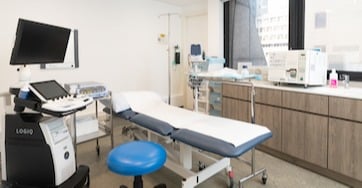As your body adjusts to pregnancy, you’ll go through changes that can sometimes be uncomfortable, irritating and even painful. For example, your levels of estrogen and progesterone hormones will usually rise during pregnancy to create a suitable environment for the baby’s growth and development.
In many cases, the symptoms you are experiencing during pregnancy are normal and common; however, sometimes they can seem very alarming (especially for new mothers).
Below, you’ll find some common discomforts that many women can experience during any stage of their pregnancy and some suggestions to help relieve them. As every pregnancy is unique, you may not experience all of these symptoms or experience them differently. If you notice any changes that concern you, speak to your doctor or obstetrician.
#1. Morning sickness
This is one of the most well-known side effects of pregnancy. But despite its name, nausea and vomiting can often occur throughout the day and not just in the morning. It can be made worse in women carrying twins, or with a concomitant urinary tract infection or thyroid disease. In severe cases, if morning sickness can’t be relieved with medications, some women may be admitted to the hospital for rehydration and intravenous anti-emetics.
- Eat small and frequent meals of dry, low-fat, carbohydrate-rich foods.
- Avoid strong seasonings and spices.
- Drink plenty of fluids (but not caffeinated drinks) by sipping throughout the day.
- Get adequate rest.
- Stop smoking and try to stay in places with good air ventilation.
#2. Heartburn
During pregnancy, heartburn is another common complaint. This occurs because of the progesterone hormone relaxes the stomach’s opening, allowing stomach acids to reflux. Don’t worry; this condition has nothing to do with the heart but involves a burning sensation in the centre of the chest.
Relief suggestions:
- Eat small, low-fat meals frequently.
- Try avoiding spicy food.
- Avoid lying down after eating and wear loose-fitting clothing.
Some women may need antacids to relieve the symptoms despite adherence to these suggestions.
#3. Constipation
Constipation can affect up to half of all pregnant women. It’s usually caused by the progesterone hormone slowing down bowel movements in pregnant women, leading to constipation symptoms.
Relief suggestions:
- Drink plenty of fluids (non-caffeinated as caffeine can make constipation worse).
- Sometimes, warmer drinks are preferred to colder drinks to relieve symptoms.
- Maintain an active lifestyle with regular exercise.
- Eat adequate amounts of food high in fibre.
#4. Dizziness
Although more common in the first trimester, the feeling of dizziness can happen throughout the whole of pregnancy. This is due to your body diverting more blood to the growing baby and uterus (womb).
Relief suggestions:
- Avoid crowded, poorly ventilated places and standing for prolonged periods.
- Do so slowly when getting up from a sitting or lying position to standing.
- Take healthy snacks throughout the day to prevent low blood sugar.
- Avoid lying on your back from the second trimester onwards.
- Wear loose, comfortable clothing.
If the dizziness is associated with palpitations, inform your doctor as soon as possible as the combination of both can indicate a more serious, underlying health condition.
#5. Swollen ankles, hands and fingers
During pregnancy, your body tends to hold more water than usual. As a result, many women will experience swelling in their body (particularly towards the end of pregnancy and a few days after delivery).
Your feet and ankles are the most common areas to be swollen, but you can also experience it in your hands, wrists and fingers. Occasionally, swelling in the wrist may manifest as carpal tunnel syndrome with numbness of the palm and fingers, but this usually resolves itself after pregnancy.
Relief suggestions:
- Avoid prolonged standing and wear non-restrictive shoes.
- Put your feet up to rest when possible.
- Do foot exercises regularly to get the blood circulating.
If you have sudden swelling of your face or limbs, or if it worries you, it’s important to inform your doctor as soon as possible. These symptoms are a common symptom of a pregnancy condition called pre-eclampsia, which presents as swelling, high blood pressure, and protein in the urine.
#6. Haemorrhoids
This symptom usually occurs towards the end of pregnancy and after vaginal delivery as the enlarged uterus (womb) puts increasing pressure on the pelvis. Unfortunately, constipation can worsen haemorrhoids.
Relief suggestions:
- Eat foods high in fibre.
- Drink adequate amounts of fluids to avoid constipation.
- Apply topical creams to haemorrhoids to relieve pain and swelling.
Haemorrhoids will usually subside after delivery, but in some cases, they may continue to become uncomfortable, necessitating surgery.
#7. Incontinence
Pregnancy will cause your body to create more urine and the growing baby, increasing pressure on your bladder. This, in combination with the hormones relaxing your pelvic floor muscles, will cause you to urinate more frequently and can result in you sometimes losing control over your bladder (aka incontinence).
Relief suggestions:
- Perform pelvic floor exercises to strengthen the muscles.
- Avoid excessive weight gain.
- Avoid constipation.
- Train your bladder by going to the toilet at increasingly prolonged intervals.
- Avoid caffeinated drinks, which will act as a diuretic.
If you are leaking, be sure to check it is urine! Otherwise, it can be your waters prematurely breaking.
#8. Perineal and vaginal itchiness
During pregnancy, most women will experience more vaginal discharge. This could lead to many experiencing vaginal itching as the excess discharge can irritate the skin.
Relief suggestions:
- Wash the perineal area gently using plain water.
- Avoid douches, perfumed soaps, bubble baths, creams and feminine hygiene products that could cause further irritation.
- Rinse the perineal area with water after urination.
- Wear pure cotton underwear and loose-fitting clothing.
- Avoiding the use of fabric softeners that can also irritate the area.
The discharge should be clear and white and not smell unpleasant. If you are experiencing troubling symptoms, you should be proactive and speak to your doctor to relieve any concerns.
#9. Itchy skin rash
Hormonal changes during pregnancy can also make your skin more prone to rashes and acne. Usually, this is more pronounced towards the third trimester – affecting areas such as the tummy, legs and buttocks. Women with stretch marks may also find that an itchy rash follows the pattern of the stretch marks. Most rashes should resolve once the pregnancy is over.
Relief suggestions:
- Apply topical emollients to help relieve the rash (in severe cases, may require topical steroids).
- Wear loose cotton clothing (preferably white to avoid irritation from colour dyes).
- Avoid scratching (it worsens the itchiness and can lead to infection).
If you are experiencing itchiness that’s not associated with a rash around the third trimester, inform your doctor immediately. It could be related to a rare condition called obstetric cholestasis (a disorder that affects your liver).
Further, if your rash has vesicles (sac or cyst), you should contact your clinic and try avoiding contact with other pregnant women until herpes zoster or chickenpox is ruled out.
#10. Pubic bone pain
You may experience some pain around your pubic bone, usually towards the end of your pregnancy. This is usually due to the hormones causing your pubic bone ligament to relax, allowing the bone to move excessively. Usually, you’ll feel pain around the pubic bone when you’re lifting your legs to walk up the stairs or turning in bed. In severe cases, walking even on level ground can be painful.
Relief suggestions:
- Pelvic floor exercises can help strengthen those muscles.
- Avoid heavy lifting and pushing.
- Wear a pelvic support belt.
- Sleep with a pillow between your legs to minimise pelvic movement when lying on your side.
- Get in and out of bed with your legs together and flexed.
How OT&P can help
It’s important to remember that this list is not exhaustive of all the symptoms you can experience, nor do you need to feel all the above symptoms. If unsure about something during your pregnancy, always speak to your doctor or obstetrician.
If you want more help and information during your pregnancy, or if you’re trying to get pregnant, at OT&P we have a team of skilled obstetricians and midwives who are experts in maternity care and women's reproductive health in Hong Kong. Simply book an appointment with us!
Alternatively, we also provide maternity packages to help ease the burden of pregnancy. Our packages provide guidance, education and medical examinations for a worry-free childbirth experience. Browse our maternity packages here.

 Central General Practice
Central General Practice
 Repulse Bay
Repulse Bay
 Clearwater Bay
Clearwater Bay
 BodyWorX Clinic
BodyWorX Clinic
 Central Specialist Clinic
Central Specialist Clinic
 MindWorX Clinic
MindWorX Clinic
 Partner Clinics
Partner Clinics
 Family Clinic
Family Clinic
 OT&P Annerley Midwives Clinic
OT&P Annerley Midwives Clinic


